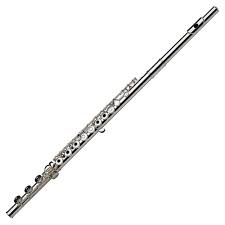flute

n. 长笛
vt. 用长笛吹奏
vi. 吹长笛
n.
长笛,长笛吹奏者;细长香槟杯;(柱上的)凹槽;(女服的)管状裙褶
v.
吹长笛,发笛声;用长笛吹,用长笛般的声音歌唱;在…上刻凹槽;
变形
复数:flutes过去式:fluted过去分词:fluted现在分词:fluting第三人称单数:flutes
双语释义
n.(名词)[C]长笛 type of musical instrument consisting of a tube of metal or wood with holes in it which are covered by the fingers or by keys
英英释义
flute
n.
a high-pitched woodwind instrument; a slender tube closed at one end with finger holes on one end and an opening near the closed end across which the breath is blown
同义词:transverse flute
a tall narrow wineglass
同义词:flute glasschampagne flute
a groove or furrow in cloth etc (particularly a shallow concave groove on the shaft of a column)
同义词:fluting
v.form flutes in
词汇搭配
用作名词 (n.)
动词+~
play (on) the flute吹长笛
put the flute to one's lips吹长笛
形容词+~
five-hole flute五孔长笛
名词+~
bamboo flute竹笛
介词+~
on the flute用长笛
词组短语
reed flute cave芦笛岩
双语例句
用作名词(n.)
Can you play the flute?
你会吹长笛吗?
He took out his flute and played on it.
他拿出笛子吹了起来。
He played a delightful melody on his flute.
他用笛子吹奏了欢快的曲调。
The child occupied himself in playing his flute.
那孩子只顾着吹笛子。
The flute on the column was inscribed with a Latin phrase.
柱子上的凹槽中雕刻有拉丁文字。
用作不及物动词(vi.)
The flute broke into a light lilting air.
长笛发出一阵轻快的笛声。
The long-drawn-out sound of a flute is coming from far to near.
悠长的笛声由远而近。
权威例句
Unequal Helical Flute Thread MillFLUTE - file delivery over unidirectional transport. RFC 3926
FLUTE: fast lookup table based wirelength estimation technique
FLUTE: fast lookup table based wirelength estimation technique
Z-MEDIA HAVING FLUTE CLOSURES, METHODS AND APPARATUS
FluTE, a Publicly Available Stochastic Influenza Epidemic Simulation Model
FLUTE: Fast Lookup Table Based Rectilinear Steiner Minimal Tree Algorithm for VLSI Design
FLUTE: Fast Lookup Table Based Rectilinear Steiner Minimal Tree Algorithm for VLSI Design
Belfast – Unionist mural on Mervue Street of Tiger’s Bay First Flute Band
Contributions to the theory of aerodynamic sound, with application to excess jet noise and the theory of the flute
flute
flute: [14] Provençal flaut was probably the original source of flute, and it reached English via Old French floute or floite. Where flaut came from, however, is another matter, and a much disputed one. Some etymologists claim that it is ultimately simply an imitation of a high-pitched sound, its initial consonant cluster perhaps provided by Provençal flajol ‘small flute or whistle’ (source of English flageolet [17], but itself of unknown origin) and Latin flāre ‘blow’; others suggest a specific blend of flajol with Provençal laut, source of English lute.The sense ‘groove’ developed in English in the 17th century, from a comparison with the long thin shape of the instrument. Related forms in English include flautist [19], whose immediate source, Italian flautisto, preserves the au diphthong of the Provençal source word flaut (American English prefers the older, native English formation flutist [17]); and perhaps flout [16], which may come from Dutch fluiten ‘play the flute’, hence ‘whistle at, mock’.=> flout
flute (n.)
early 14c., from Old French flaut, flaute (musical) "flute" (12c.), from Old Provençal flaut, which is of uncertain origin; perhaps imitative or from Latin flare "to blow" (see blow (v.1)); perhaps influenced by Provençal laut "lute." The other Germanic words (such as German flöte) are likewise borrowings from French. Ancient flutes were direct, blown straight through a mouthpiece but held away from the player's mouth; the modern transverse or German flute developed 18c. The older style then sometimes were called flûte-a-bec (French, literally "flute with a beak"). The modern design and key system of the concert flute were perfected 1834 by Theobald Boehm. The architectural sense of "furrow in a pillar" (1650s) is from fancied resemblance to the inside of a flute split down the middle. Meaning "tall, slender wine glass" is from 1640s.
flute (v.)
late 14c., "to play upon the flute," from flute (n.). Meaning "to make (architectural) flutes" is from 1570s. Related: Fluted; fluting.
1. A pipe organ gives much more volume than a violin or flute.
管风琴发出的音量比小提琴或笛子都大。
-- 来源 -- 英汉 - 辞典例句
2. He amused himself by playing the flute.
他吹笛自娱。
-- 来源 -- 英汉 - 辞典例句
3. I like to play the flute.
我喜欢吹长笛。
-- 来源 -- 英汉 - 辞典例句
4. The flute player piped a happy tune.
那个吹笛子的人吹奏了一支欢快的曲子。
-- 来源 -- 英汉 - 辞典例句
5. At last he asked me if he should play upon his flute to me.
最后他问我要不要听他吹笛子。
-- 来源 -- 英汉 - 辞典例句
6. He took out his flute, and blew at it.
他拿出笛子吹了起来。
-- 来源 -- 英汉 - 辞典例句
7. From near, then far, comes the solemn, tragic sound of a flute.
由远而近传来悲壮的笛声。
-- 来源 -- 英汉 - 辞典例句
8. He has skillfully played that flute.
他熟练地吹奏了那笛子。
-- 来源 -- 英汉 - 辞典例句
9. In the middle section the "fixed idea" reappears in waltz time, introduced by flute and oboe.
在中部,长笛和双簧管用园舞曲的节奏再次引出了“固定乐思”。
-- 来源 -- 英汉 - 辞典例句
10. He plays the flute like a professional.
他吹长笛已达到专业人员的水平。
-- 来源 -- 英汉 - 辞典例句
